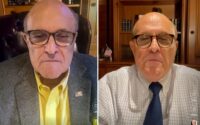Putin ‘supplied’ missile that downed flight MH17: probe
There are “strong indications” that Russian President Vladimir Putin personally signed off on the use of the missile that shot down Malaysia Airlines Flight MH17 over eastern Ukraine in 2014, international prosecutors concluded Wednesday.
Members of the multinational Joint Investigation Team announced they would be closing the investigation as they revealed the findings, saying the evidence of Putin’s and other Russian officials’ involvement was not concrete enough to secure a criminal conviction.
“The investigation has now reached its limit,” prosecutor Digna van Boetzelaer told a news conference in The Hague. “The findings are insufficient for the prosecution of new suspects.”
Russia has denied any involvement with the downing of the civilian airliner flying from Amsterdam to Kuala Lumpur, which killed 298 passengers and crew who hailed from more than a dozen countries, although nearly 200 were Dutch citizens.



In Nov. 2022, a Dutch court convicted two former Russian intelligence agents and a Ukrainian separatist leader of murder for helping arrange the delivery of the Russian BUK missile system that was used to shoot the plane down from a military base and putting it into position for its launch. One Russian was acquitted by the court.
The three convicted defendants, Russians Igor Girkin and Sergey Dubinskiy, and Ukrainian separatist Leonid Kharchenko, were tried in absentia and remain at large.
Oleg Pulatov, the only suspect represented by defense lawyers at the trial, was acquitted for lack of evidence.
The Russian Foreign Ministry at the time accused the court of eschewing “objectivity and impartiality,” and bowing to pressure from Dutch politicians, prosecutors and the news media.

The most senior defendant in the trial was Girkin, a 51-year-old former colonel in the Russian Federal Security Service or FSB. At the time of the downing, he was defense minister and commander of the armed forces of the breakaway Donetsk region and now is involved in the Ukraine war.
Dubinskiy, 60, was a former officer in the Russian military intelligence service, the GRU, and one of Girkin’s deputies in 2014. Like Girkin, he was in regular contact with Russian officials in 2014 and was also head of intelligence in the breakaway Donetsk region.
Kharchenko was described as the commander of a pro-Russian rebel combat unit who took orders directly from Dubinskiy.


Pulatov, 56, was a former officer in the special units of the GRU who was a deputy to Dubinskiy at the time MH17 was shot down.
At the time the jetliner was shot down, Ukrainian forces were fighting Russian-backed separatists in eastern Ukraine’s Donetsk region.
While Russia had annexed Crimea from Ukraine in March 2014, it denied military involvement in fighting in Donetsk at that time.
But as part of the conviction of the three men in November, the Dutch court ruled that Russia had in fact had “overall control” of separatist forces in Donetsk starting from May 2014.
Prosecutors said Wednesday they could not identify the specific soldiers responsible for firing the missile system that downed the plane, which came from Russia’s 53rd brigade in the city of Kursk.
They cited a 2014 phone intercept between Russian officials as evidence that Putin’s approval had been necessary before a request for equipment made by the separatists could be granted.

In addition, they played a 2017 conversation between Putin himself and the Russian-appointed chief administrator of Ukraine’s Luhansk province in which they discussed the military situation and a prisoner exchange.
Piet Ploeg, who heads a foundation representing the victims of MH17, said he was disappointed that the investigation had ended, but was glad prosecutors had laid out their evidence for Putin’s involvement.
“We can’t do a lot with it, Putin can’t be prosecuted, he said. “We wanted to know who was ultimately responsible and that’s clear.”
Ploeg’s brother, his brother’s wife, and his nephew died on MH17.
With Post wires


